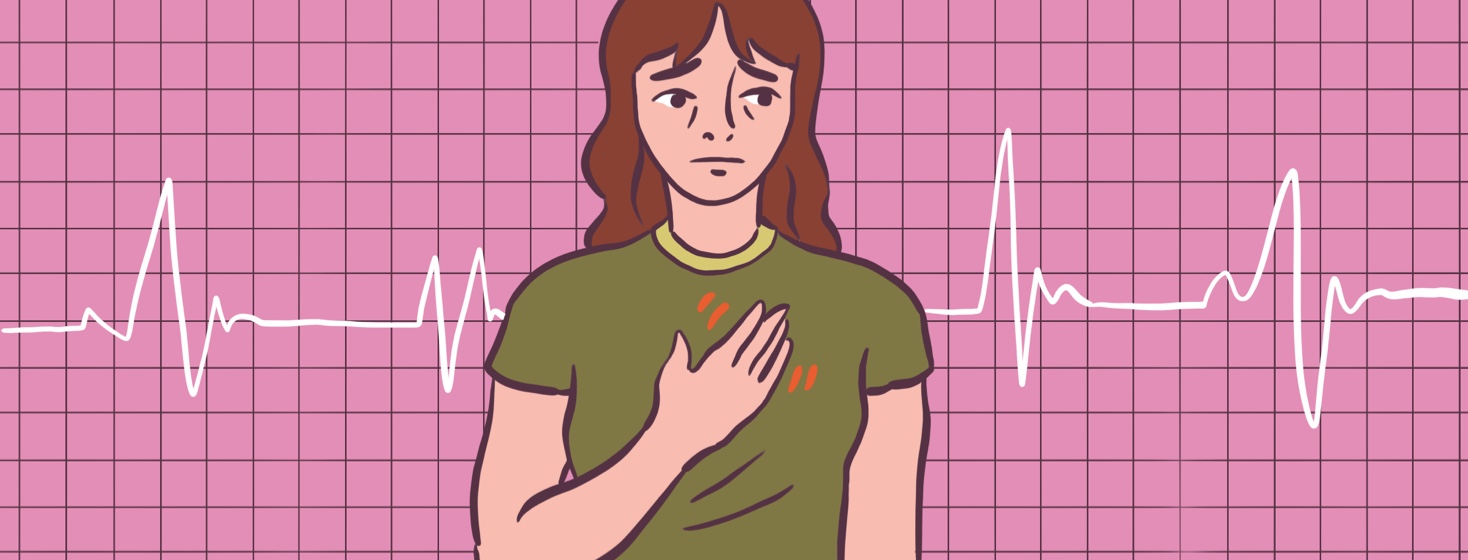Palpitations – Dealing with the Extra Beats
There are a lot of new experiences that result from a heart attack or any diagnosis that points to a problem with your heart. We get new doctors, medications, and a new way of eating and living. But what we also get is super tuned into our bodies. We sense anything that is out of step, including our heartbeats.
After leaving the ICU eight years ago from a heart attack that seemed to come out of nowhere, I found my anxiety was really high. As a result, I was super aware of every twitch and pang, especially in my chest, and I soon cared about those anomalies called palpitations.
What are palpitations?
‘Palpitation’ is a broad term, but it can include extra beats, missed beats, every 'galumph' or feeling that a fish is flopping in my chest, a pounding sensation, or a flutter. It is different from what I considered a normal heartbeat or heartbeat rhythm. They do not feel good and contributed to my heightened fear of returning to the emergency room (ER) or cath lab and, worse, to the morgue.
During the bad times, putting my 16 pound purring cat on my chest was helpful. I soon could not distinguish between her purrs and my extra beats. The flaw in this solution was that she was not always purring and was not always ready and able to sit on my chest on demand. So I asked my care team.
Talk to your heart doctor
When your doctor asks how it is going, be sure to tell them how you are feeling and what you are feeling. I had several conversations with my cardiologist and even recorded some strange rhythms with a mobile EKG.
I have an implantable cardioverter-defibrillator (ICD), which functions to get me out of a bad arrhythmia. The quarterly data downloads of this device also started to show an increase in extra beats in the form of premature ventricular contractions (PVCs). My electrophysiology team gave me a monitor to wear for 7 days and did some bloodwork which is normal given the symptoms. The monitor did confirm extra beats – both the frequency and type. My blood work appeared normal and ruled out any other underlying issues.
The extra beats were deemed benign but still annoying and uncomfortable. With the results, I worked with my cardiologist to adjust my medications to work to reduce the frequency.
When to be concerned
When I leave a doctor's appointment, I always ask this question with the answer to my question: "When do I call you or go straight to the ER?" I did the same with my palpitations.
I spoke with my cardiologist about my symptoms with my condition and when I should be concerned. For my condition, she explained that if I experienced chest pain or discomfort during these episodes, it could be an issue with my heart and to call her right away.
For now, my extra beats are just that – extra beats. However, we will continue to keep an eye out for increases. Typically, with increases in the frequency, other measures, such as ablation – a procedure that scars areas of the heart that work to block the irregular rhythms, can be done. While I have not had this procedure, I know many of my fellow patient peers who have had this and had success.
What else can you do?
I invested in a Kardia device to measure my EKG. In my readings, I could start seeing premature ventricular contractions, also known as PVCs. The dips in my EKG corresponded to these uncomfortable 'galumphs' I could feel.
Featured Forum
View all responsesIt reminded me of Edgar Allen Poe's 'Telltale Heart," where the beating heart in the wall haunted the killer. It was not a pleasant thought. But sometimes, catching those pesky PVCs on my Kardia is fun, and I can send a recording to my cardiologist.
I always recommend journaling to document your symptoms – when they happen, when you took your meds, late meal, etc. After some time, I could correlate some with dehydration or hormonal fluctuations. By gathering more data, I was able to have better conversations, which enabled more treatment options.
What I have learned is that everyone experiences extra beats. I probably had many of them before my heart attack, but I did not pay attention. As heart patients, we are more tuned into the extra activity, which doesn’t feel good and increases our anxiety. However, there are many strategies to combat the occurrence, and you can work with your care team to find the best solution.
My best advice patient to patient
- Talk to your doctor about how you feel.
- Journal your symptoms and when you take your medications, eat, exercise, etc.
- Palpitations may be benign (only your doctor can determine this), but there are strategies to improve your quality of life.
Share your experience with heart failure
Do you have a heart failure story? Click the button below to share with our community!

Join the conversation